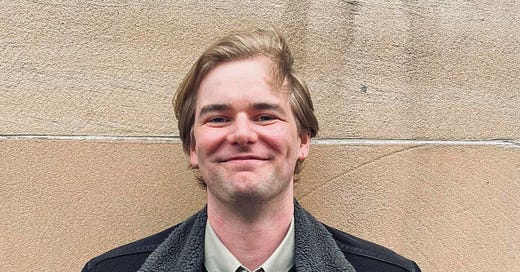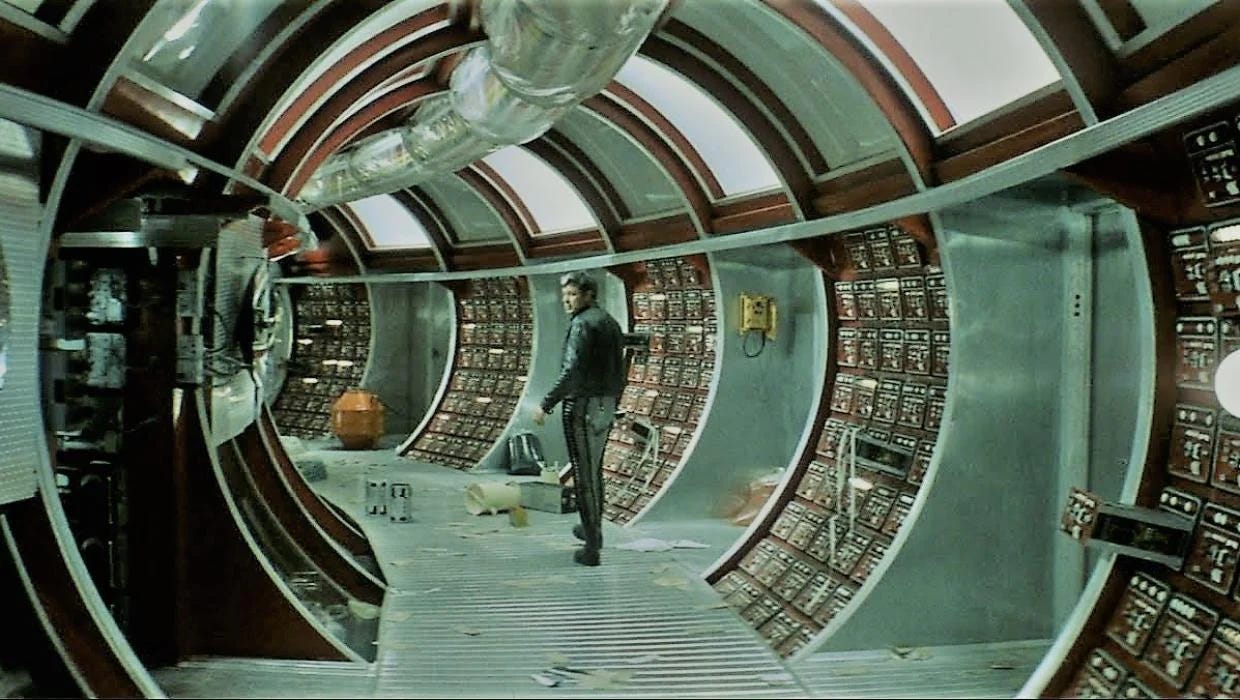Meet the Poets: Stuart Rawlinson
Stuart talks to us about his poems "Waning Gibbous" and "Prompt", what he's reading at the moment, the poems he loves, and how he first got into poetry
You can read Stuart’s poems, and listen to Stuart read them himself, in Issue One of the Seaford Review.
What can you tell us about these poems?
Waning Gibbous might be my most rejected poem, so I'm really happy it has found its home. It grew out of wanting to try a couple of things: first, writing my own “modern take on Greek myth” poem, and second using the slashes throughout, almost instead of line breaks. I had seen a lot of examples of both and I thought trying them out might make me write a little differently. I think I had just turned thirty and was a little more anxious than usual about getting older. I was also thinking about how I wanted the slashes to mark a split between different voices or ideas, so I settled quite quickly on the story of Ganymede and Zeus. The whole thing has really grown over a couple of years of editing and re-shaping, but these core ideas have remained throughout. I was very happy with the combination of subject and form when I started to think of the slashes as like twigs in a nest, hopefully bringing us back to the eagle imagery.
The title was one of the last things to change: for a long time this was just called Ganymede, thinking it might need to be grounded in the myth from the start. When I thought again about the line about Ganymede the moon of Jupiter (the “ninth largest object in our solar system”) the phase of the moon just past its prime seemed a perfect fit.
“Prompt” comes out of my very ambivalent feelings towards poetry prompts. I love formal exercises and constraints, but I find most writing prompts to be based on subject matter — “write about a time when x happened”, or “describe your feelings when you last y”, etc. I really struggle to write directly about my life like that, and prompts like this really tap into anxieties about my skills and approach as a poet. I think that's where this very scathing, antagonistic voice came from when I first just tried to write a list of absurdist prompts as a writing exercise. I quickly came to like this idea of having the voice of the poem explicitly outside and set against the poet.
I knew I wanted a recurring image to pull it all together, and I had put on one of the new Neon Genesis Evangelion films for background noise while I was editing one evening. The idea of inspiration or the poem itself being this monstrous alien slowly lumbering towards a poet before they meet and collapse into one another seemed too fun to pass up.
What poets and poems are you in dialogue with?
Wanting to write about myth seems pretty common in poetry, but I have always admired the approach taken by poets such as Anne Carson and Sandeep Parmar. I always go back to Carson’s Autobiography of Red; especially one the initial appendixes, where we find Helen of Troy sitting up with her glass of vermouth. Parmar's work is similarly allusive but in particular I was thinking of her second collection Eidolon, also another take on the story of Helen. Both treat the myth/story we know as something of a framework to work out their own ideas within/against, rather than retell or update the story. Formally I took a lot of inspiration from poets such as Vik Shirley and Hieu Minh Nguyen.
For Prompt, I was thinking about prompts like the ones found in Nine Arches Press's 52 series. This features a huge range of prompts, including some more formal ones I can get on board with.
If you're not familiar with Evangelion I honestly don't know how I could explain it here, other than to say it is the absolute best and worst of anime. (If you are familiar with it, feel free to swap out the image of Godzilla in the poem for one of the angels)
What poem do you wish you'd written?
There's a few things out there that, rather than wish I'd written them, I really wish I knew how to write like them. I really admire James Schuyler's work, especially longer works like Hymn to Life. I'm always amazed how Schuyler combines the New York Poets sensibilities with a real sense of calm and equilibrium you do not normally find in such work. The way he bounces around images in a poem like February calls to mind the O'Hara or Ashbery approach to subject matter, but it's all in this strange, quasi-Wordsworthian style of repose and recollection.
On a lighter note, part of me wishes I'd stuck with guitar lessons when I was younger so I could be in a Cheekface tribute act. I don't think I'll ever write a line as good as “The future is now! (Unfortunately)”.
What's your first poetry memory?
I'd studied poems in school, but I think the first time I remember enjoying them was actually in an exam. A high school English exam required a close reading of a Louis MacNeice poem, I think it was “The Sunlight on the Garden”, and I just connected with it right away. I bought my first collection, his Selected Poems, soon after.
What's on your bedside table?
I'm currently swapping between A K Blakemore's The Glutton and Nuar Alsadir's Animal Joy, both of which are fantastic – although Animal Joy’s passages about “false poems” had me guiltily rewriting a couple of my own. I'm looking forward to starting Goodlord by Ella Frears, which I picked up after seeing her and Caroline Bird at Push the Boat Out a few weeks ago.
I've also got Nisha Ramayya's Fantasia and a recent edition of Shearsman magazine sitting ready to start. I also have a copy of Jane Eyre at my boyfriend's place which I am very, very slowly working my way through. It has not improved my opinion of “classic” Victorian novels, if I'm honest.
What's your favourite text(s) about the sea?
It feels embarrassing/basic to admit, but I do love Moby-Dick. I would not exactly say it is under-appreciated, but you tend not to hear about how mad and even queer some of it is. I always find the back and forth between adventures on the high seas and some truly bizarre “informational” chapters strangely compelling.
“Texts about the sea” also makes me think of the final passages of Virginia Woolf's To The Lighthouse, with Lily finishing her painting as she watches the Ramsay family traveling by boat.
I've been on a bit of a sci-fi kick since I picked up my old flatmate’s Consider Phlebas during lockdown, and one of the best I've read was Stanisław Lem’s Solaris. It is a strange, unsettling novella set in a station orbiting a planet entirely covered in ocean. I don't want to say more, but the book and the Tarkovsky film are both well worth checking out for a sombre, contemplative sci fi experience.
Oh, and of course there's Master and Commander: The Far Side of the World.
Oh, and I almost forgot to include any time the cast of The Real Housewives of New York get on a boat…








